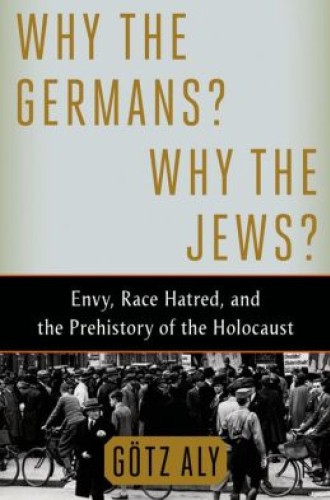Never again?
In 1920, not long after the Great War, a little-known agitator gave a speech in Munich on the topic, "Why Are We Anti-Semites?" The speaker concluded that it was important to prevent Germany “from suffering a death by crucifixion."
Of course this agitator became quite well known—it was Adolf Hitler—and we know what his antisemitism led to. Hitler had to know what he was doing with that sickening reference to crucifixion. It echoed the centuries-long slander of the Jews as “Christ killers” and thereby suggested that what “they” did to Jesus they would in time do to pure-blood Germans. It’s a reminder that we should never assume heated rhetoric is hollow and without consequences.
In Why the Germans? Why the Jews? Götz Aly addresses one of the most troubling and enduring questions of the 20th century: how could the German nation kill six million Jews? Hitler’s allusion to the crucifixion aside, Aly doesn’t focus on religious difference. He never considers the representation of the Jews in John or in Luther. Instead, his explanation is rooted in class and ethnic resentment.
Jews took much better advantage than Gentiles did of the economic opportunities provided by the Industrial Revolution. Jews were more committed to the education of their young, which gave them more of an elite status. Growing resentment of Jewish advancement came to a head after the German defeat in World War I and the humiliation of the Versailles Treaty. Powerless to get back at their external enemies, masses of Germans looked for a scapegoat from within.
Jews fit that bloodthirsty need, a need that clever rebels like Hitler were able to exploit soon after the war. The discontentment reached a tipping point when the Great Depression hit, giving Hitler and his party the opportunity they had been craving for over a decade.
Aly provides ample documentation about the growing antisemitism that led to the Holocaust. Still, it leaves me scratching my head. How, really, did so many Germans of conscience look the other way? Of course there was resistance on the part of the Confessing Church, including Dietrich Bonhoeffer and others. But it was a silent majority that made it possible for Hitler and company to carry out their dastardly deeds.
One telling anecdote will suffice: Cardinal Michael Faulhaber of Munich received a letter from a Catholic expressing deep concern over what was happening to the Jews in Germany. Faulhaber responded that it was his Catholic duty to look the other way. “The course of action against the Jews,” he wrote,
is so un-Christian that every Christian and not just every priest would have to oppose it. But the higher Church authorities have far more urgent questions to address at the moment…. We can assume the Jews will be able to help themselves and thus that we have no call to give the government a reason to turn their persecution of the Jews into a persecution of Jesuits.
What was more important to the cardinal than standing up for the Jews? Caring for Catholic schools, making sure Catholic associations were kept alive, and dealing with their concern over the sterilization program in Nazi Germany.
One of the ironic outcomes of Germany’s treatment of the Jews is that Gentile Germans learned from the Jews. Aly suggests that the attributes we now attribute to the Germans—austerity, industriousness, academic achievement, entrepreneurship—weren’t always characteristics of the German tribes. Germans learned the hard way that it was up to them to study and work hard and look for their own opportunities for advancing themselves, rather than resenting the success of the Jews and then wanting to bring them down to earth.
Aly is not sanguine about the prospects of avoiding future holocausts. We can and should say along with Holocaust survivor Elie Wiesel, “Never again.” But words are not enough. We have to be vigilant, lest the conditions resurface that could lead to genocide of one group or another—such as the ominous laws enacted against gays and lesbians in Uganda.
This post was edited on March 25, 2014.





